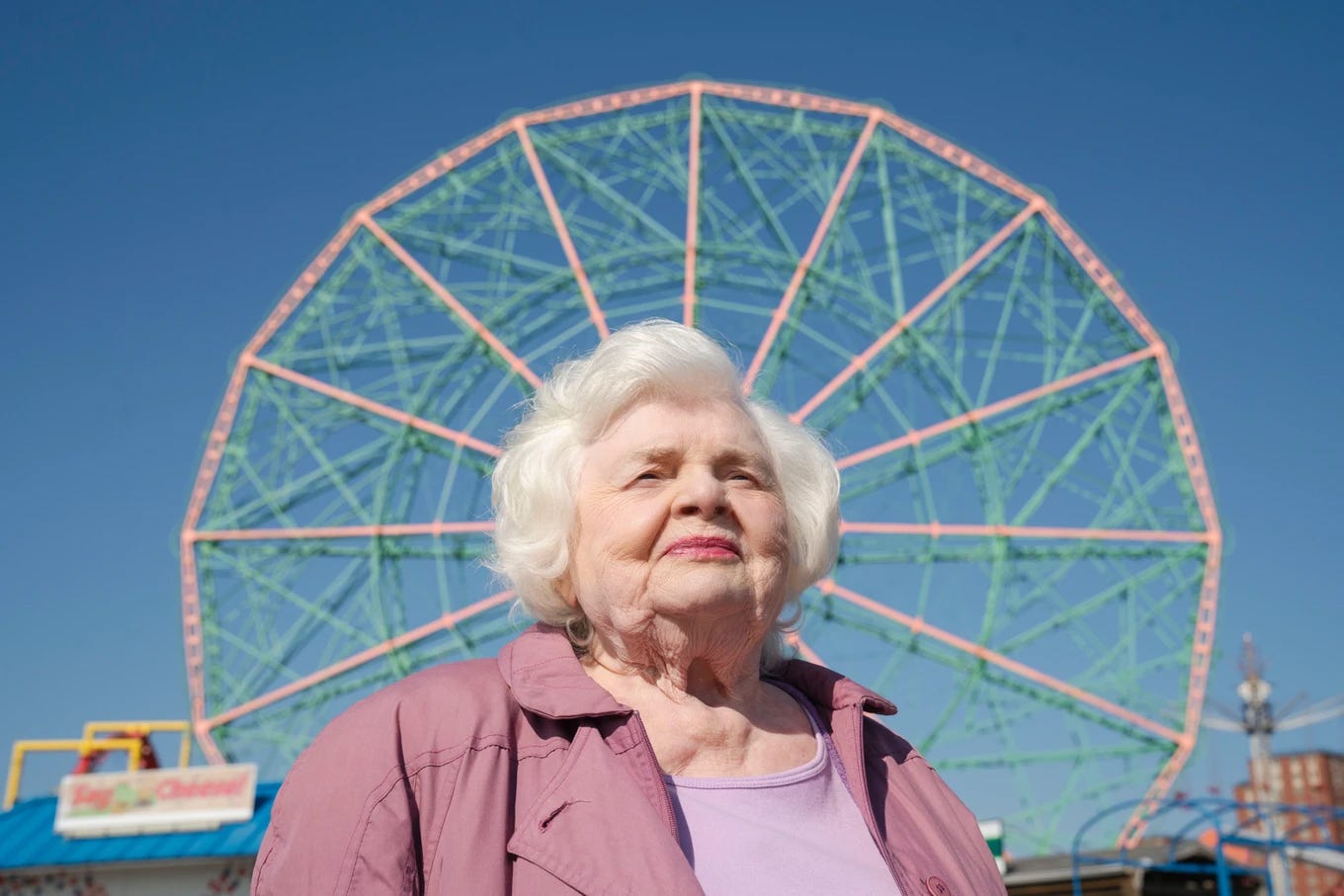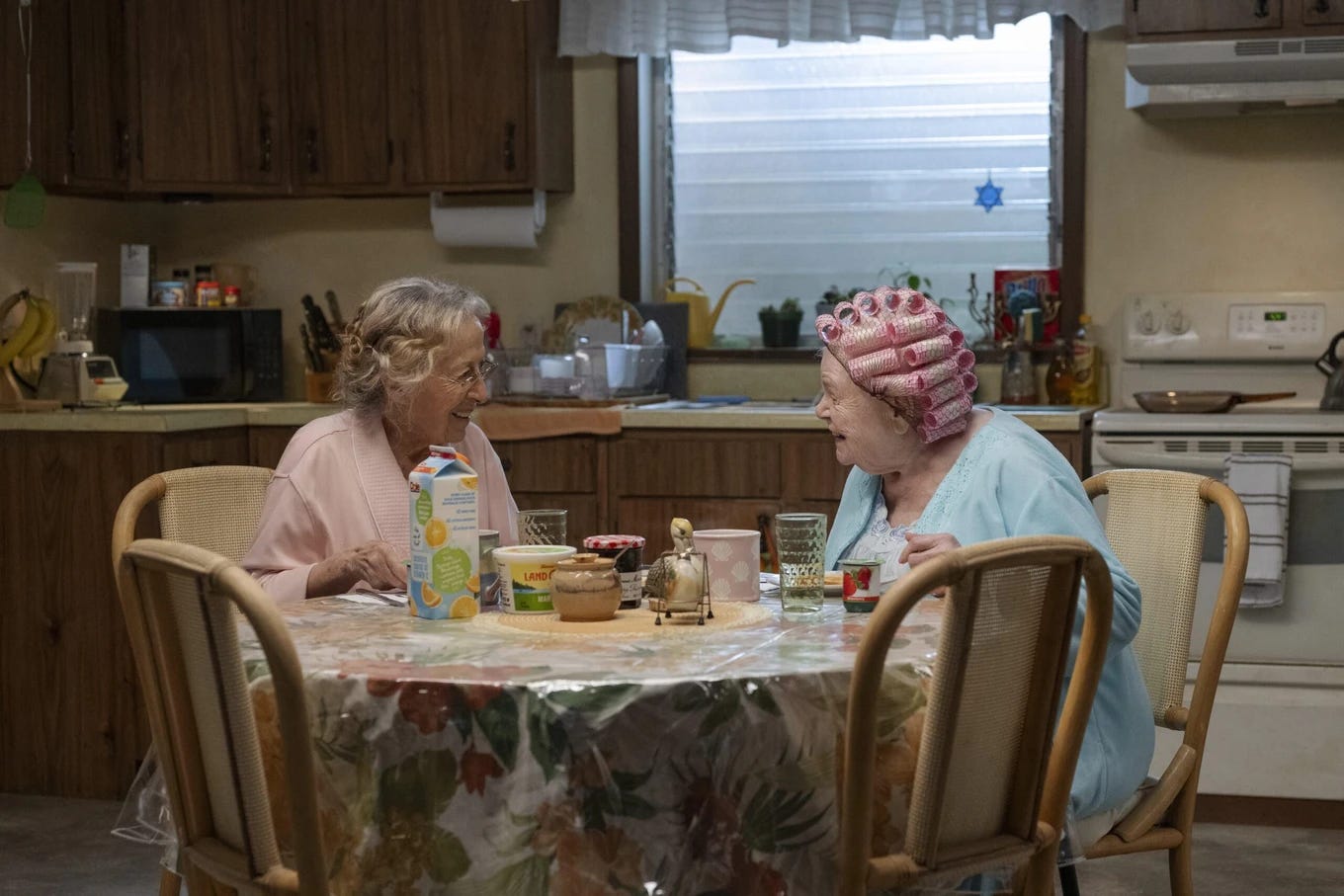Eu acompanho o trabalho de Scarlett Johansson desde Ghost World (2001), bem antes da ascensão ao estrelato interpretando a anti-heroína Viúva Negra dos Vingadores e da dupla indicação ao Oscar, em um mesmo ano, por História de um Casamento e Jojo Rabbit. Eu tenho a impressão, unilateral obviamente, de que as nossas carreiras estão entrelaçadas, uma sensação que compartilho com outros atores, atrizes ou diretores, que estavam presentes durante o amadurecimento do meu conhecimento e da minha (in)sensibilidade na crítica de cinema. Deste modo, até tem um gosto especial assistir a este Eleanor, The Great, a estreia de Johansson na direção em uma comédia dramática simpática, despretensiosa e emocionante. Uma história que não imaginava que a atriz tinha dentro de si, que relaciona a sua herança judaica (por parte de mãe) às ‘mentiras’ da arte interpretativa.
June Squibb interpreta a personagem-título, uma senhora voluntariosa de 94 anos que, ao lado da melhor amiga, Bessie (a atriz israelense Rita Zohar), aproveita a alvorada de sua vida. Então, Bessie falece. Isto abre um vazio emocional em Eleanor - visualmente representado através do banco da praia que dividia com a amiga. Até um conjunto de eventos e a amizade com Nina (Erin Kellyman), que vive o relacionamento conturbado com o pai amoroso, mas ausente Roger (Chiwetel Ejiofor), acabarem levando Eleanor a mentir de uma forma que acredita honrar a memória da amiga: assumir sua identidade de sobrevivente do Holocausto. A mentira aumenta e foge do controle, da sinagoga até à rede nacional, com resultados que conhecemos já tivermos assistido a, ao menos, um filme em que uma personagem decidiu mentir pelo que acredita ser um bom motivo.
Existe uma razão legítima para mentir? Johansson organiza duas frentes: literalmente, via roteiro, Eleanor deseja conservar a memória da amiga que é também a memória de uma etnia, em um tempo em que há cada vez menos sobreviventes do holocausto, cada vez menos histórias de carne e osso. E, apesar de Eleanor começar a gostar da atenção que tem recebido, em um momento de solidão e saudade, isto não enfraquece a beleza do gesto de relembrar a amiga. É a transgressão derradeira de Eleanor, a vítima de uma sociedade etarista representada pela filha Lisa (Jessica Hecht), que ama a mãe, apenas não tem tempo para lhe dedicar em virtude da correria e impaciência da rotina de uma vivência capitalista. O relógio é um símbolo intrigante, pois aponta o esvaziamento do tempo de uma vida - e Eleanor não é mais uma garotinha, não é mesmo? -, e também a pressa em continuar vivendo o tempo que resta e esvai rapidamente.
A segunda frente é a arte da atuação, e Johansson entende bem do que está discutindo. O ato de ser emprestar o seu corpo para ser um outro, no palco, em frente às câmeras, ou na sociedade, ‘interpretando’ a imagem de uma pessoa que não se é, até o momento em que a fronteira entre o eu e o outro se misturam inseparavelmente. Eleanor, de uma maneira fofa e sensível, embevece-se de Bessie, tal como atores e personagens, e é esta relação umbilical que faz com que a mentira se perpetue, mesmo que isto torne a doce Nina refém da mentira.
Tentando o certo pelo meio errado, Eleanor, The Great ainda prioriza a família antes do trabalho, não limitada só à família sanguínea, como àquela construída ou fortalecida a partir dos encontros inesperados. É um trabalho de estreia doce, celebratório da vida e do tempo, pois talvez seja o seu caráter fugidio que confira a beleza de viver. O tempo que provoca saudade e é resgatado nas memórias, o tempo que remenda as feridas dos entes queridos, o tempo que revela a verdade atrás da mentira.
Eleanor, The Great está na mostra Um Certo Olhar do Festival de Cannes 2025.
English Review
I have been following Scarlett Johansson's work since Ghost World (2001), well before her rise to stardom playing the Avengers' anti-heroine Black Widow and her double Oscar nomination in the same year for Marriage Story and Jojo Rabbit. I have the impression, obviously unilateral, that our careers are intertwined, a feeling that I share with other actors, actresses and directors, who were present during the maturation of my knowledge and my (in)sensitivity in film criticism. Thus, it is even a special pleasure to watch Eleanor, The Great, Johansson's directorial debut in a sympathetic, unpretentious and moving dramatic comedy. A story that I had no idea the actress had inside her, which relates her Jewish heritage (on her mother's side) to the 'lies' of the acting art.
June Squibb plays the title character, a strong-willed 94-year-old woman who, with her best friend Bessie (Israeli actress Rita Zohar), enjoys the dawn of her life. Then, Bessie dies. This leaves an emotional void in Eleanor - visually represented by the beach bench she shared with her friend. Until a series of events and her friendship with Nina (Erin Kellyman), who is experiencing a troubled relationship with her loving but absent father Roger (Chiwetel Ejiofor), end up leading Eleanor to lie in a way that she believes will honor her friend's memory: by assuming her identity as a Holocaust survivor. The lie escalates and spirals out of control, from the synagogue to the national network, with results that we know of if we have seen at least one movie in which a character decided to lie for what she believes to be a good reason.
Is there a legitimate reason to lie? Johansson organizes two fronts: literally, through the script, Eleanor wants to preserve the memory of her friend, which is also the memory of an ethnic group, at a time when there are fewer and fewer Holocaust survivors, fewer and fewer stories of flesh and blood. And, although Eleanor begins to enjoy the attention she has been receiving, in a moment of loneliness and longing, this does not diminish the beauty of the gesture of remembering her friend. It is the ultimate transgression of Eleanor, the victim of an ageist society represented by her daughter Lisa (Jessica Hecht), who loves her mother, but just does not have time to dedicate to her due to the rush and impatience of the routine of a capitalist life. The clock is an intriguing symbol, as it points to the emptying of time in a life - and Eleanor is no longer a little girl, is she? -, and also the rush to continue living the time that remains and quickly disappears.
The second front is the art of acting, and Johansson understands well what she is discussing. The act of being, lending one's body to be someone else, on stage, in front of the cameras, or in society, 'interpreting' the image of a person one is not, until the moment when the border between self and other become inseparably mixed. Eleanor, in a sweet and sensitive way, is captivated by Bessie, just like actors and characters, and it is this umbilical relationship that makes the lie perpetuate, even if it makes sweet Nina a hostage to the lie.
Trying to do the right thing by the wrong means, Eleanor, The Great still prioritizes family over work, not limited only to blood family, but also to that built or strengthened from unexpected encounters. It is a sweet debut work, a celebration of life and time, because perhaps its fleeting nature is what confers the beauty of living. The time that causes longing and is rescued in memories, the time that mends the wounds of loved ones, the time that reveals the truth behind the lie.






